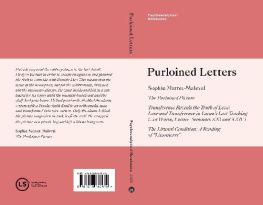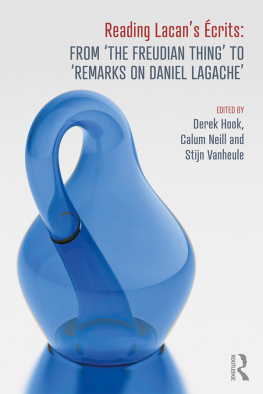Purloined Letters
Psychoanalytical
Notebooks
Issue 35, June 2020
Director of NLS Publications: Alexandre Stevens
Consulting Editor: Pierre-Gilles Guguen
Editor in Chief: Janet Haney
Cover Image: Alasdair Duncan
Text setting & cover design: Linda Lundin
Translator: Arunava Banarjee
Proofing: Catherine Alexander and John Haney
Published by the London Society of the NLS
Correspondence Address:
Psychoanalytical Notebooks, 42D Maple Street, London W1T 6HF, UK
Email:
Copyright Psychoanalytical Notebooks, June 2020
ISBN 9781916157620
Contents
Janet Haney
Editorial
Purloined Letters
Sophie Marret-Maleval
Transference Reveals the Truth of Love:
Love and Transference in Lacans Last Teaching (or Worse, Encore, Seminars XXI and XXIV)
The Littoral Condition:
A Reading of Lituraterre
In the middle of editing these texts, I took a short break to watch a film, based on true events, about a group of men struggling to write (right) (wright) the end of a badly told story. They were doing it with the substance of their lives. The story begins on a terrible day in Vietnam in 1966. A strategic error sees a company of American soldiers walking into a well laid Vietcong trap and taking heavy casualties. Next, as a result of a tactical error, the American artillery begins dropping shells on these beleaguered men. A medical evacuation helicopter then arrives to airlift casualties out of the jungle, and, to cut a long story short, a young Air Force medic is lowered into the middle of the battle and saves more than sixty lives. He presses a love letter to his girlfriend into the hand of a wounded man who is rescued by the helicopter and who makes it back to the USA. Our medic doesnt make it home; the love letter is not delivered; and the paperwork that should have led to his posthumous medal is suppressed to save the honour of the officer who fumbled the overall planning of the operation. The main action of the story, thirty years later, sees this officer, now a US Senator, on his way to the top of the political heap, while some of the survivors of the disaster are still suffering profoundly and trying to deal with their pain and to get our hero the medal he deserved. The story is resolved when each of these purloined letters the love letter and the paperwork relating to the medal reaches its destination. It is only when the medic is assured of his medal in an official ceremony conducted at the very centre of his society that the wounded soldier is able to deliver the love letter to the woman for whom it was intended. Taken together, the letters organise the action that heals the wounds. They draw the threads to make a more manageable hole around which relations get reorganised and castration is accepted. As a result, each man manages to move on.
Such an examination of the film is made possible by Lacans seminar on Edgar Allan Poes The Purloined Letter, which is placed (against chronology) as the first paper in the crits . The opening paper in the Autres crits is Lituraterre, and there are many reasons, as Jacques-Alain Miller says in his prologue to that book, why it seemed predestined to occupy the same primary place. Each paper gives the orientation for reading the rest of each book to the letter. Similarly, each of these papers gives our current issue of the Notebooks its own compass points. The first of the three papers by Sophie Marret-Maleval collected here is her revolutionary reading of the life of a Frenchman who struggled to hold himself together by purloining a famous painting and forming a vital relationship with it. The third is her close reading of Lacans landmark text Lituraterre. The second paper in the series is a dissection of love and transference questions vital to the psychoanalytical clinic. These three papers offer the reader an encounter with the letter of Lacans later work. To read them is to experience something of the discourse of psychoanalysis as hewn by Lacan. By pitting your wits against them it is possible to reshape and renew the way in which you engage with life, literature, and practice.
Professor Sophie Marret-Maleval is an Analyst Member of the School (AMS) and a member of both the New Lacanian School and the cole de la Cause Freudienne. She is the current director of the Department of Psychoanalysis at the University of Paris 8, the department established by Lacan himself in the 1960s.
Janet Haney
June 2020
Sophie Marret-Maleval
Sophie Marret-Maleval
In Lacans last teaching, the Other is progressively reduced to its silence (following a trajectory which I will not develop here), i.e. to S(). He equivocates on nommer (naming), writing it n apostrophe hommer , with an h , which could be read as making a man, and which condenses nomination and becoming human. Language is what makes our humanity, it is what creates man.
Lacan goes on to say that naming is an act; naming is the act of adding a dit-mension . This time there is an equivoque on dimension: he adds dit , the spoken, the dimension of what is said. In other words, naming adds the fourth dimension, that of knotting, by adding the dimension of what is said, which means that the act of naming is that of saying. It is the act of enunciation, that is, the action of the S which produces the spoken, or what is said, here consisting in the adjunction of a dimension (rather than the traditional dimension of utterance). The subject, by choosing to place himself as existing within the field of language, alienating himself to the signifier by saying, knots the three dimensions constitutive of the speaking being, correlating them to his saying. In that sense the three dimensions are correlative to each singularity, existing by and for one. Everyone has to find a way with them and knots them in their own way, be it borromean or not. The S designates the speaking being as pure difference, it makes him exist as one, he makes the thing arise as real by inducing the loss of the object that causes desire and that governs his jouissance and around which his master signifiers revolve. Therefore, the knot will be borromean when the signifier and jouissance are connected by the phallus (the connection between the function of speech, i.e. that of the S and jouissance, becomes its function in Seminar XXIII ). It will not be borromean when this connection is not ensured.
The S then occupies a major place in Lacans last teaching. It is the signifier bearing the identification of the subject, reduced to the unary trait, to the fact of counting oneself as one, and of being identical to oneself only in that regard. It also has the function of a letter insofar as the impact of language the institution of the speaking being results in the loss of the object (the word is the murder of the thing). It makes the thing arise as real, following the function of nomination, but it has the function of an edge with the real, which enables the connection of the symbolic and the real. The function of connection is what allows for the knotting of the elements.
Ill try to explain this complex articulation by following Lacans steps in Seminar XXIII , where he relies on Joyces psychosis to push his construction in RSI and put it to the test. Lacan starts with the fault of the knot and the possibilities of supplementing the flaw of the paternal function to give it a new interpretation. I will rely on Joyces second epiphany to highlight the unknotting of the imaginary when the function of the S is not put into play. I will then highlight the knotting function of nomination with the captivating story of a man who stole a Rembrandt.












